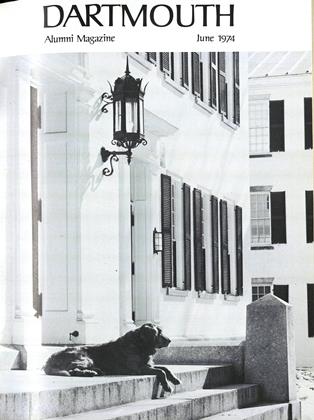One of the undeniable facts of life at Dartmouth, on which alumni and students would agree without dissent, is that autumn is a fine season to be in the Hanover area. Alumni of the College demonstrate their conviction by returning in droves for football games, mini-reunions, and leaf-peeping tours; un- dergraduates manifest theirs by nominating fall term as the least desirable for off-campus study, jobs, or vacation
Although not even the most starry-eyed theoretician would have predicted, when the Dartmouth Plan for year-round operation was implemented, that student enrollment would ever reach the ideal of numerical equality for the four terms, there was hope that peaks and valleys might level off. It was recognized that push might come to shove in the fall, given the fact that enrollments have always been highest in the first term of the academic year and the requirement that all members of the freshman class be in residence for their first three terms as Dartmouth men and women. The further requirement that each student spend at least one summer term on campus was counted on to counterbalance in part the storied lure of "those sharp and misty mornings."
So far, so good for the planners. Some 3,170 students are expected to register for the fall term of 1974, fewer than the 3,184 enrolled for the comparable term of 1969, the 3,175 in 1970, or the 3,238 in 1972. But what the statisticians failed to reckon with was the shifting winds of undergraduate preference - in this case, the unpredictable reversal of a hitherto growing trend toward off-campus housing. Whether coeducation can be praised - or blamed - for the increased charms of dormitory life is anybody's guess, but the indisputable fact emerged, when time came for housing contracts, that 1,533 upperclassmen signed up for 1,422 available dormitory beds. After a mild housing crunch last fall, remedied by a not-unprecedented conversion of a few singles to doubles and doubles to triples, it appears that push has come to shove for the first term of 1974-75.
When the discrepancy between the numbers of students wishing to live on campus next fall and the amount of space available became apparent, several potential solutions to the dilemma were run up the administrative flagpole, to the accompaniment of few student salutes. A tentative proposal for more than the customary fall doubling-up was withdrawn after cries of "overcrowding." The suggestion of a campus-wide lottery to determine which 100 or so students would be put on a waiting list, to be assigned dormitory rooms as they became available, met with outraged editorials in The Dartmouth. Student counter-proposals that exchange students either not be accepted or required to find off-campus housing or that the size of the freshman class be reduced were rejected on grounds of institutional commitment and long-range balance.
The problem was solved in part with President Kemeny's announcement at a mid-May press conference that the Hanover Inn Motor Lodge will be used as an overflow dormitory. The possibility of a lottery lingered, however, as a means of selecting students to occupy the Motor Lodge, should an insufficient number volunteer.
Meanwhile, the Trustees will consider at their June meeting the construction of a new dormitory, originally proposed by the Committee on Year-Round Operation but held in abeyance until registration patterns under the Dartmouth Plan were clarified by time.
 View Full Issue
View Full Issue
More From This Issue
-
 Feature
FeatureEducation in the Round
June 1974 By ANDREW J. NEWMAN AND MELANIE FISHER -
 Feature
FeatureChina's Barefoot Doctors
June 1974 By PETER KONG-MING NEW AND MARY LOUIE NEW -
 Feature
FeatureCASTLES ON THE CONNECTICUT
June 1974 By JAMES L. FARLEY -
 Feature
FeatureO Pioneers
June 1974 -
 Feature
FeatureRetiring Professors
June 1974 -
 Article
ArticleRetirement: Plan It and Enjoy
June 1974 By RICHARD S. BURKE '29








